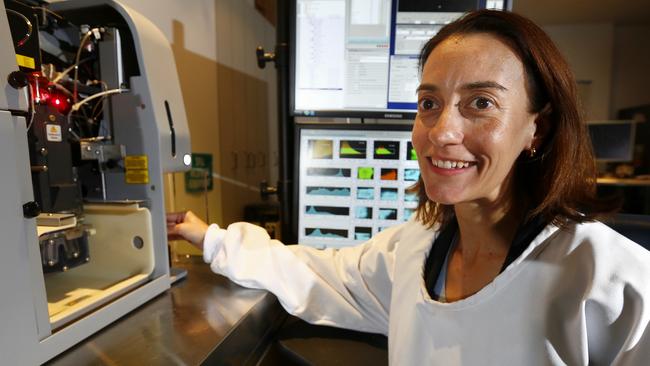Peter MacCallum Cancer Centre in $3m blood trial on tackling breast cancer
VICTORIAN women with a type of advanced breast cancer will be the first in the world to get a “liquid biopsy”.

VIC News
Don't miss out on the headlines from VIC News. Followed categories will be added to My News.
VICTORIAN women with a type of advanced breast cancer will be the first in the world to get a “liquid biopsy”.
The blood test helps detect crucial genetic mutations in their cancer, granting the women access to a new generation of focused treatments.
By measuring DNA shed by cancer into the bloodstream, Peter MacCallum Cancer Centre researchers have developed a test to gauge if cancer treatments have stopped working, months earlier than do standard invasive biopsies.
After showing the tests were as accurate as bone marrow biopsies, they are now starting one of the first large clinical trials of whether the test can improve treatment.
The $3.3 million trial will screen 440 women in Australia and New Zealand, who have oestrogen receptor positive metastatic breast cancer, for a PIK3CA gene mutation.
This mutation is expected to be present in 40 per cent of these cancers and is a key mechanism allowing cancer cells to grow and spread.
The trial will test whether an experimental PIK3CA inhibitor — which aims to block signals telling cancer cells to divide and multiply — can control cancer for longer than standard treatments, an alternative for women who have exhausted all other options.
Peter Mac associate professor Sarah-Jane Dawson said the trial was an important development in further proving the technology’s use.
“There are no trials like this happening internationally and we hope it will be a step closer to showing the benefits of this technology, and making it more readily available,” Prof Dawson said.
“These trials are exciting because they’re providing access to a new technology that hasn’t previously been available, and to a new drug that is still in development.”
Women with this type of cancer are not routinely tested for the genetic mutation of their cancer, which involves an invasive biopsy.
The trial, funded by the National Health and Medical Research Council and co-ordinated by Breast Cancer Trials, will use the liquid biopsy in the first instance to identify which women carry the genetic mutation and will then be used subsequently throughout treatment to measure whether the tumours are shrinking.
“The idea is, if you can identify the presence of the mutation and treat it directly with a targeted therapy, those patients may have a better outcome,” Prof Dawson said.
“There is research to show that these therapies can be very effective in patients that carry this particular genetic mutation.”


